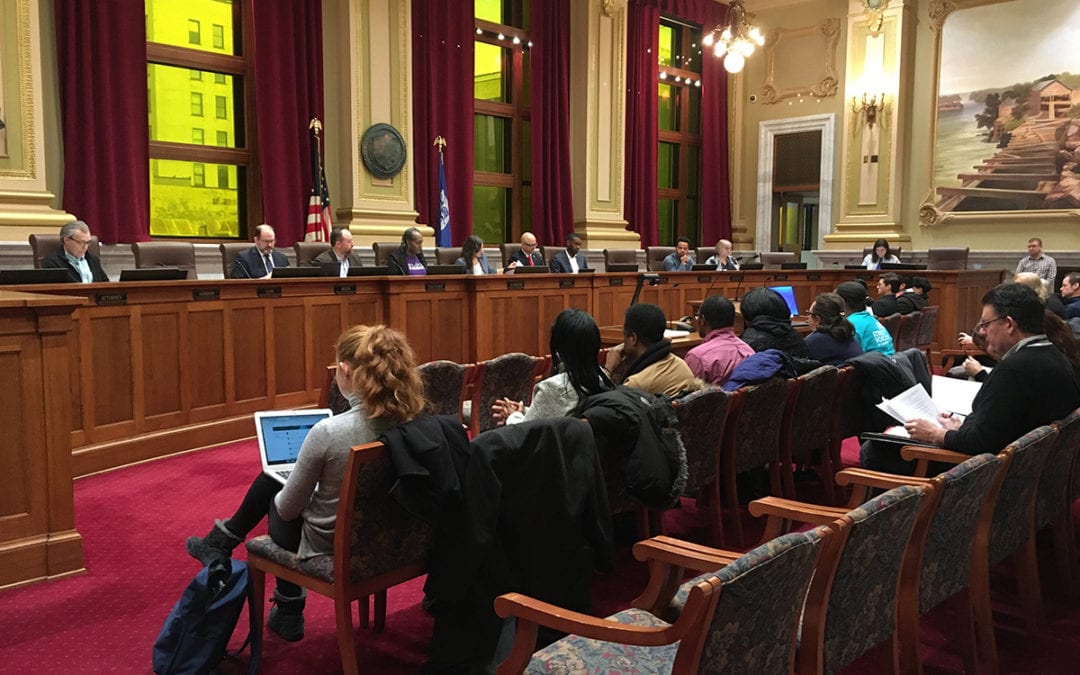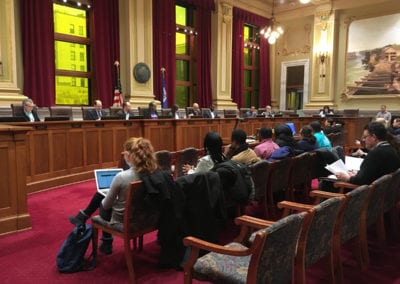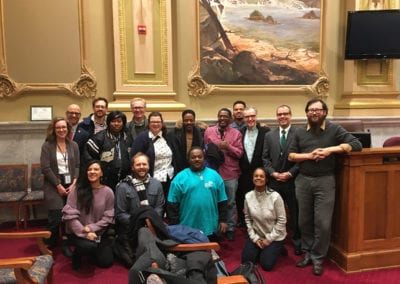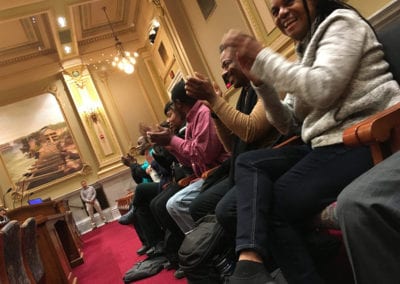November 22, 2019 – Minneapolis, MN. The Minneapolis City Council unanimously approved the zoning code text amendment titled “Intentional Community Cluster Developments” as part of a strategic effort to create innovative housing types and address homelessness in Minneapolis. This zoning code text amendment allows, for the first time in Minneapolis, the conditions necessary for people experiencing homelessness to live in housing designed and constructed within an attainable budget. This zoning change paves the way for the Envision Community Collaborative to build its proposed 2-year demonstration community, housing between 15-30 people in homes clustered around a common house, living cooperatively as an intentional community.
Addressing a systematic cause of homelessness in Minneapolis. One of the many reasons people face homelessness is that “affordable housing” is NOT affordable. Zoning regulations such as large minimum square footages and including a mandatory kitchen and bathroom in every unit drive up the cost of housing. The “Intentional Community Cluster Development” zoning change creates a new unit type in Minneapolis known as a “rooming unit” which does not require a kitchen or a bathroom, and also drops the required minimum lot square footage to 325 square feet per person in higher density zoning districts. This zoning change shows the City’s deep commitment and strategic approach to addressing homelessness in Minneapolis.
How it happened. The Envision Community Collaborative is led by members from Street Voices of Change, an organization of individuals with current or past personal experiences with homelessness who come together to make positive changes in the systems that keep people in homelessness. Street Voices members are the true experts about homelessness and their expertise guided every step of the process to create viable housing for themselves and others experiencing housing instability. The Minnesota Design Center and Alchemy Architects used their architectural knowledge to help turn the Street Voices members’ input into architectural plans. This work combined with research conducted by Upstream Health Innovations, the innovation team for Hennepin Healthcare, around setting a sustainable price point, resulted in plans to use micro housing with shared facilities. The Collaborative recognized that their plans violated zoning codes in Minneapolis and approached City Council Members and Mayor Frey in mid-2018 to discuss the possibility of changing zoning to allow their plans.
The City’s deep commitment. The City Council and Mayor Frey’s commitment to create innovative housing solutions for the homeless was evident from the start. “It was exciting to work with the City. It felt good to know they were behind us and wanted to help people experiencing homelessness,” said Frederick Toran, an Envision Leader from Street Voices of Change. Another Envision Leader from Street Voices, Rome Darring, described the City’s approach by saying, “It was nerve racking at first to work with the City, but I learned the City Council and Mayor wanted to make sure they were making the right decision for Minneapolis. They gave us a lot of advice about how to maneuver through the process. The City really set us up to succeed in this zoning process.” Council Members Gordon, Schroeder, and Ellison introduced the zoning code text amendment in December 2018, and since that time, City Staff explored how to allow this new type of housing while still ensuring the safety and fit with neighborhoods where intentional community cluster developments will be located. As part of their exploration, Robin Garwood from Council Member Gordon’s office and Karlee Weinmann from Council Member Schroeder’s office reached out to Envision Leaders from Street Voices and architects from the Minnesota Design Center and Alchemy Architects to assist with creation of the zoning change. “They included us in every step of the process, not just our architects but people with lived experience [of homelessness] were always at the table,” said Dewayne Parker, an Envision Leader from Street Voices of Change. This process resulted in a detailed staff report1 by Madel Duenas, Minneapolis Senior City Planner, containing the language of the ordinance and explaining the zoning code text amendment. The staff report then went through a series of approvals to reach the City Council including the Planning Commission on October 21st and the Zoning and Planning Committee of the City Council on November 14th. The City Council approved the zoning change today.
Ground-breaking change. While multiple cities across the country do allow tiny home villages like intentional community cluster developments, few are allowed in residential zones of major cities. These villages are usually relegated to industrial zones or outside city limits where few zoning restrictions exist. The City of Minneapolis has chosen not only to allow this type of housing in Minneapolis, but welcome people in a homeless situation to live in residential zones, truly including them in our community. “It means so much to be welcomed by the larger community of Minneapolis. The good that comes from that acceptance is big,” said Rome Darring, an Envision Leader from Street Voices of Change. The allowance of Intentional Community Cluster Developments in residential zones affirms the City’s deep commitment to addressing homelessness in Minneapolis in a truly inclusionary way.
Catalyzing the process. One great catalyst for this zoning change was generous funding for the construction of Envision’s first micro unit by the Pohlad Family Foundation and Local Initiatives Support Corporation (LISC). City officials mentioned that tiny homes are frequently suggested as a means to help the city’s homeless population. However, the city cannot presently put those ideas or suggestions through the zoning approval process. They needed communities of people with lived experience of homelessness collaborating with organizations from our community to put forth a viable plan for micro housing in Minneapolis. How else can the City work through all the details of zoning, such as minimum square footages, setbacks, and parking requirements, unless they have a real plan? The building of Envision’s first unit helped the City take those plans through the zoning process.
Benefits for a diverse range of people. Intentional community cluster developments expand the housing options for many types of people in Minneapolis. This zoning change will not only help people experiencing homelessness, but also anyone who is interested in reducing their carbon footprint, living communally, or shrinking their housing costs. Envision Community seeks to create a diverse community from across the housing stability spectrum by selecting not only people who have experienced homelessness but also selecting residents with stable housing backgrounds who want to live smaller and live in community.
No single solution will end homelessness. The intentional micro communities allowed by this zoning change are not a silver bullet that will end homelessness in Minneapolis. People experiencing homelessness have various needs and desires for housing and intentional micro communities are intended only for individuals who want to live smaller and live in community. We hope this change will inspire our community to address deeper causes of homelessness like the lack of livable incomes, the exclusion of renters based on their background, and our inadequate investment in affordable housing.
Next steps. This zoning change allows significant savings for the future residents of Envision Community. The demonstration project is estimated to cost 60% less to develop per person when compared to similar permanent supportive housing because the greatly reduced building footprint and decreased utility requirement resulting from the shared facilities that are now allowed by this zoning change. Having reached this milestone, the Envision Community Collaborative now seeks land in Minneapolis and funding for the 2-year demonstration project. As part of this effort, the collaborative will be hosting tours of their show unit at Elim Church in early 2020. If members of our community are interested in learning more about Envision, touring the unit, donating land, or helping fund the project, please contact us at EnvisionCommunityMN@gmail.com or reach out to representatives from the collaborative listed below
City_Council
Envision Community Members watch the Minneapolis City Council consider the zoning change that will allow microhousing communities like Envision in Minneapolis.
Group_Zoning_Change
The group that worked on zoning change. Top row: Karlee Weinmann, Council Member Jeremy Schroeder, Dylan Linet, Junail Anderson, Tom Fisher, Heather Simon Carlson, Dewayne Parker, Freddy Toran, Council Member Jeremiah Ellison, Council Member Cam Gordon, William Walsh, Robin Garwood. Bottom row: Madel Duenas, Pastor Paul Olson, Rome Darring, Sherry Shannon.




